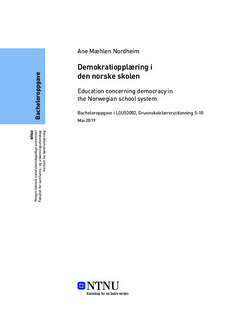| dc.contributor.advisor | Heggem, Reidun | |
| dc.contributor.author | Nordheim, Ane Mæhlen | |
| dc.date.accessioned | 2019-08-23T14:07:28Z | |
| dc.date.available | 2019-08-23T14:07:28Z | |
| dc.date.issued | 2019 | |
| dc.identifier.uri | http://hdl.handle.net/11250/2610283 | |
| dc.description.abstract | Demokratiopplæring er en meget viktig del av skolens oppdrag. Denne oppgaven ser nærmere på hva som ligger i skolens mandat om å gi elevene tilstrekkelig opplæring for at de skal kunne gå ut i samfunnet som demokratiske medborgere. Dette innebærer å se på hvilke demokratiske verdier som formidles, hvordan dette gjøres og hva de ulike styringsdokumentene sier at skolen skal formidle. Forskningsspørsmålet som er den røde tråden gjennom oppgaven er dette:
Hvilken forståelse har samfunnsfaglærere av demokratiopplæringen slik den er presentert i Kunnskapsløftet? Og hvordan styrer dette deres praksis i klasserommet?
Det empiriske grunnlaget i oppgaven er samlet inn gjennom kvalitative, semi-strukturerte intervjuer gjort med tre samfunnsfaglærere ved en skole i Trøndelag. Gjennom en sammenfatning av funnene fra intervjuene vil du få et innblikk i disse lærerne sine holdninger til demokratiopplæring, hva de ser på som en god medborger og hvordan de aktualiserer demokrati i sin undervisning. Disse funnene blir blant annet sett i forhold til utvalgte funn fra ICCS-undersøkelsen fra 2016. Av andre teoretiske grunnlag er det for meg naturlig her å nevne Theo Koritzinsky som en viktig person. Han har blant annet en teori om at opplæring i demokrati både må inneholde opplæring i, om og for demokrati. Dette er noe lærere i skolen har en forståelse av at er det meste, men indikatorer peker på at praksis i klasserommet ikke reklekterer dette. Det sistnevnte blir et viktig diskusjonspunkt i drøftingen i denne oppgaven. | |
| dc.description.abstract | A very important role the school has is that they have to make the students democratic citizens. This article takes a closer look at what the school has to do to make sure that the students gets an adequate education concerning democracy that makes them able to function in the social, democratic society. This involves taking a closer look at which democratic values the schools are built on. It also involves studying the Norwegian national documents concerning education and look at what they have to say about what the schools should teach the students about democracy. The following research question has been defined based on the thematic that has been introduced:
How do teachers in social studies understand education concerning democracy based on how is is portrayed in “Kunnskapsløftet”? And how does this effect their method of teaching?
The empirical foundation that this article is built upon is collected thorough a qualitative method using interviews with three teachers in social studies from one school in Trøndelag. Through a summary of this interviews you will see that the teachers have split opinions concerning different sides of education concerning democracy. The data from the qualitative interviews is inter alia compared to data from the international study ICCS. Theo Koritzinsky has been an important source to information about education concerning democracy and his opinion on the matter will be important throughout the discussions in this article. | |
| dc.language | nob | |
| dc.publisher | NTNU | |
| dc.title | Demokratiopplæring i den norske skolen | |
| dc.type | Bachelor thesis | |
